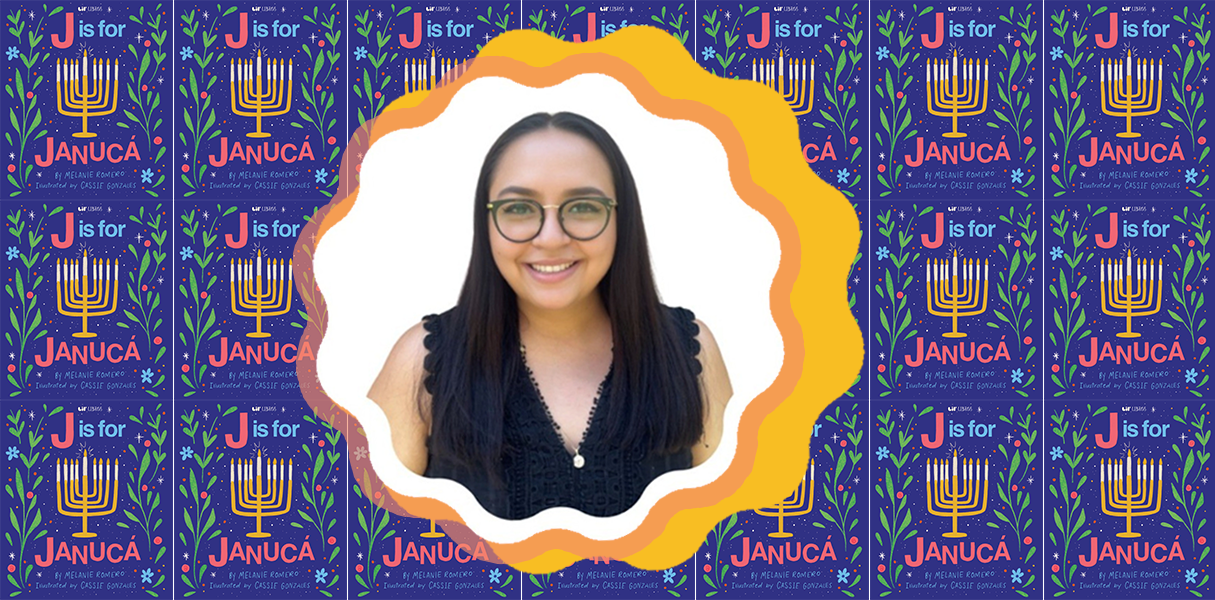Growing up as a Mexican Jew in northern Mexico meant that I stood out by default. Every year when November came around, my house was the only one with a Hanukkah menorah peeking through the window (to be fair, we also had a Christmas tree, because my siblings aren’t Jewish). While most of the kids around me went to posadas, ate gingerbread cookies, and drank ponche, I got latkes (potato pancakes) and sufganiyot (jelly-filled donuts) with Chocolate Abuelita instead (although I was still forced to attend Misa de Gallo every year to appease my very Catholic grandmother). We were different and as much as I loved it, it was also a very lonely thing to experience as a kid and teenager. I always felt like I couldn’t fully explain what my holiday meant to me, especially when met with the question “Isn’t Hanukkah just “Jewish Christmas?” (the answer is NO!). Last year, though, my Hanukkah childhood wish finally came true when I found out my friend (and fellow Mexican Jewish writer) Melanie Romero was writing a Janucá-themed children’s book: J is for Janucá.
Romero’s upbringing was somewhat similar to mine. She grew up in Villa Park, CA (a small, conservative, and predominantly white town) with a Catholic mother and a Jewish father who had an agreement to raise their kids in the Mexican tradition (ie, one that is heavily influenced by Catholicism). Her Jewishness wasn’t something that was openly spoken of at home, but rather a part of her identity that she was able to reconnect with and reclaim after losing her father to cancer and starting college at USC.
Because of the heavy Catholic influence that permeates Latinx culture, it is hard to see oneself as a Latinx Jew represented in the media. We don’t get catchy seasonal songs in our native language, cheesy Janucá movies, or even books written about us. J is for Janucá might just be the first of its kind! When I spoke to Romero about it, she was very clear on her inspiration: “I wrote J is for Jánuca for two things: to finally see a Hanukkah book on the bookshelf in arm’s reach for any child, Jewish or not, to curiously take hold of, and to pay homage to the small pockets of Latinx-Jewish communities around the world that shine as fiercely in our lives as our Hanukkah candles.”
About seeing herself represented in the media as a child, Romero says, “I find it so important for little ones to see themselves represented in the media, whether in a book, a television series, a film… My childhood would have been much more empathetic if I had seen a version of myself in the media, and I never did: Who would ever dream up a little Mexican-Jewish girl with wavy hair who was from neither here nor there?”
J is for Janucá is bringing us closer to telling all the stories that need to be told. Not just for little Latinx Jews like Romero and I were, but for any kid who wants to learn a bit more about others. With the help of words like aceite, bendiciones, kugel, and tierra—words that relate in one way or another to the miracle of Hanukkah, Romero sheds light (pun intended) on traditions celebrated by some members of the Latinx community. The book, written in both English and Spanish, offers a peek into the cultural and historical importance behind this Jewish holiday that occurs around the same season as Christmas.
Speaking of multicultural backgrounds, there is more than one valid way to be Jewish (just like there is more than one valid way of being Latinx). Romero, for example constantly tries to close the gap between all her cultural identities: Mexican, Swedish, and Jewish during the holidays: “I eat latkes with a side of mole rojo and make challah with cardamom (a beloved spice used by the Swedes)”. For her, Janucá is about traditions and honoring all the different parts of her identity, “I truly believe having all my cultures together at the table makes me feel closer to my Mormor, my paternal grandmother born and raised in Sweden to Jewish parents who moved to Mexico at 17 for a taste of a new life.”
I couldn’t agree more, honestly. I have the privilege of being a Mexican Jew—two cultures with a history of people fighting for their right to exist even when they’re villanized by others, who are deeply proud of their roots, and with mothers who will make enough food to feed a whole soccer team. I am deeply proud of all the bits and pieces that are part of my cultural identity (especially the fact that I get to enjoy things like the churro challah or my mom’s matza ball caldito de pollo when I’m sick). I wouldn’t change that for the world and as far as I can tell, Romero feels the same way: “I’m very proud to finally possess this sense of belonging I lacked in my childhood. I enjoy bridging together my two worlds, and as I’ve always said, I will safeguard the importance of both of my faiths and my heritages. I will raise my future kids in a Spanish-speaking environment with Swedish cinnamon rolls for breakfast, chilaquiles for lunch, and challah for (Friday night) dinner.”
J is for Janucá will hopefully prevent other Latinx Jewish kids from going through what we went through: the mean comments from kids (and parents), the ignorance, the antisemitic remarks. It holds space for the religious and cultural traditions of a minority within a minority—Latinx Jews—and that can only ever be a good thing. I believe that everyone, young or old, can benefit from learning about the traditions of different groups. Especially given the current state of the world, becoming a bit more familiar with traditions that are “foreign” or different from our own and feeling empathy for those who believe things different than you only be a good thing.

